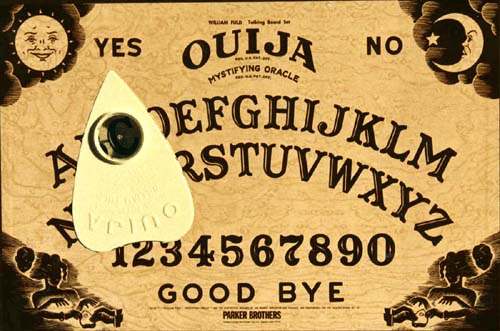 Ouija boards, also known as talking boards, have been in use for hundreds, if not thousands of years in one form or another. The most clear examples are talking boards widely used during seances during the hay day of the Spiritualism movement during the early part of the 20th century.
Ouija boards, also known as talking boards, have been in use for hundreds, if not thousands of years in one form or another. The most clear examples are talking boards widely used during seances during the hay day of the Spiritualism movement during the early part of the 20th century.In modern times Ouija boards find themselves at the heart of investigations into what are called "negative entities" or "demons". Modern folk lore points to Ouija boards as being at the beginning of most manifestations of "demons" into the lives of those foolish enough to make use of them.
Talking boards have been debunked as early as the 1970's by paranormal investigators.
 Investigators created their own board, randomly shuffling the letters and numbers and asked groups of psychics to ask questions of these boards while they were unable to see the letters being indicated. The answers produced during those experiments were always random orders of letters.
Investigators created their own board, randomly shuffling the letters and numbers and asked groups of psychics to ask questions of these boards while they were unable to see the letters being indicated. The answers produced during those experiments were always random orders of letters.It is believed that the indicator of a Ouija board is moved either consciously or unconsciously by one of the operators in the group who is acting as the dominant controller of the indicator. The controller may or may not be aware that they are controlling the answer although answers that come into their head either through intuition or actual knowledge of the subject matter being asked then appears through the indicator. Operators who have read extensively may have knowledge about a subject in vast detail which they are not even aware of on a conscious level and may be tapping into that knowledge during the use of a Ouija board.
Some practitioners of the occult believe that talking boards create the potential for problems and attribute them as a cause for negative entities because the boards work as the focus for a summoning ritual but provide no protection for the participants and do not provide any instruction or means for banishing the entity summoned after the ritual is successful.
Wherever the truth resides in all of these claims it is clear that some users of talking boards continue to receive answers to their questions and are frightening themselves when this occurs. If you are thinking of using a talking board for fun with a group of friends, my advice is to leave well enough alone. Don't go looking into the world of the human unconscious or ghosts unless you are ready to confront whatever might be staring back at you.
The History
What is a Ouija board? Ouija boards came into existence as a parlor game in the mid-1800's, when spiritism and channeling were at the height of fashion. The word "Ouija" is a blend of the French and German words for "yes." Adolphus Theodore Wagner first patented Ouija boards, sometimes referred to as "talking boards," in London, England on January 23, 1854. In the
 patent, Wagner called his invention a "psychograph" and its purpose was to read the minds of people with "nervous energy." By 1861, Frenchman, Allan Kardac, was describing the Ouija board as instruments with which to open communications with the spirit world. In seven short years, the Ouija board had evolved from a mind-reader to portal of communication with the dead.
patent, Wagner called his invention a "psychograph" and its purpose was to read the minds of people with "nervous energy." By 1861, Frenchman, Allan Kardac, was describing the Ouija board as instruments with which to open communications with the spirit world. In seven short years, the Ouija board had evolved from a mind-reader to portal of communication with the dead.Modern Ouija boards were developed by inventor William Fuld. Fuld sold his patent to Parker Brothers in 1966. Ouija boards, as we recognize them today, look nothing like the original prototypes. The 20-25 million Ouija boards sold by Parker Brothers consist of a rectangular game board that is covered with a woodcut-style alphabet, the words yes, no, and good-bye, and the numbers 0-9. Also included with the "game" is a heart-shaped plastic planchette. The planchette is the 'pointer' that is supposed to glide over the board under the direction of supernatural forces and form comments and questions by pointing out questions and comments. Parker Brothers has marketed Ouija Boards under the tagline, "It's only a game - isn't it?"
No comments:
Post a Comment